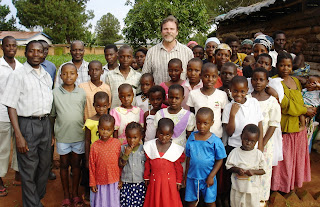
Hopegivers International in one of three Major Ministry Partners of CitiHope International. In addition to sponsoring food and medical relief in Malawi valued at 2 million dollars a year, Hopegivers initiated a HopeHome program this year in conjunction with CitiHope.
HopeHomes are an informal foster care provision of extended family homes in villages and towns headed by guardians (grandmothers, neighbors, family members) who take in 6-12 orphans into their homes and provide them with the “seven hopes” of every child: for nutrition, health, shelter, safety, education, family and protection.
In January 2006, Dr. Samuel Thomas, President of Hopegivers International(a major ministry Partner of CitiHope International since 2005, committed to opening the first of many community-based Hope Homes for orphans and abandoned children in Malawi.
Hope Home #1 Rev. and Mrs. Maurice Munthali, Presbyterian Church
In September 2006, the first Hope Home in Malawi was funded by Hopegivers International through an initial $5,000 grant to CitiHope. Subsequently, a total of $40,000 was granted to CitiHope for the establishment of four Hope Homes in 2007 through the Major Ministry Partnership of Hopegivers and CitiHope International.

Photo: CitiHope staff Mr. Paul Moore, Dr. Tanya Soldak and Dr. Michael Christensen with Rev and Mrs. Muntahli in their home in September 2006)
Rev. Maurice Munthali, Deputy General Secretary of the Presbyterian Synod of Livingstonia, Central Church of Africa, and former pastor of a 5,000 member church in Malawi was selected to operate the first Hope Home in Malawi. He and his wife, Thandi, have three children of their own and have adopted 12 orphans whose parents died of AIDS.

Extended families are now common place in Malawi, Africa, where at least 15% of the population is believed to be infected with the HIV virus. There are now over 900,000 orphans in a country of 13 million people. The way the churches are responding with compassion, how ministries are rescuing orphans, and how families are opening the doors of the homes to orphans and widows is exemplary. What they need most is tangible Christian support in the form of nutrition, medicine, clothing and educational opportunities for their adoptive children.
Rev. Munthali and his wife, Thandi, have three children of their own and have adopted 12 orphans whose parents died of AIDS. (photo: Munthali family members with Dr. Penny Muelenaer)
Elementary school is free in Malawi up through the 8th grade, but secondary school is not. Girls are lucky if they are allowed to stay in school through 8th grade. Most of Munthali’s adopted children are in secondary school or beyond. Hope Scholarships were made available to the Munthali family for direct reimbursement for food or educational needs in 2007 by Hopegivers International.
HopeHome #2 Rev. and Mrs. Copeland Nkhata, Pastor, The United Methodist Church, Mzuzu Circuit, Malawi

This wonderful pastor and his church family have taken in 11 orphaned or vulnerable youth, who are not members of the church. Rev. Nkhata says they all could use some help, especially for their food and education. Again, Hopegivers International through CitiHope is sponsoring this HopeHome in 2007, so that the children can be fed, educated, feel secure, be safe, and have hope for the future.

Michael Glenn, CFO of Hopegivers International, visited Rev. and Mrs. Nkhata at their Hope Home in January 2007 (pictured below) and approved the on-going expenditure of funds for the extended family of orphans that has now grown to 23.

“Many more Hope Homes are needed to replace the lost and broken families resulting from the HIV epidemic there,” according to Dr. Sam.
Hopegivers and CitiHope have committed themselves to delivering $2 million of medicine and nutritional food, and opening a total of four HopeHomes in Malawi in 2007.